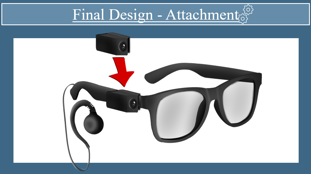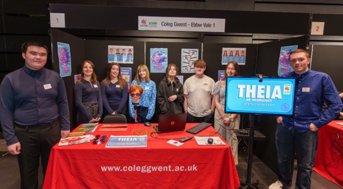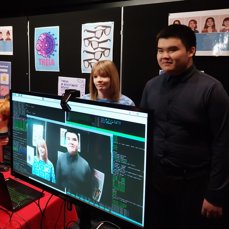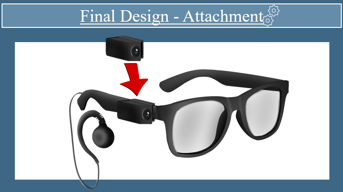Posted:
9 April 2025
A Gold CREST Awards case study: bringing AI into dementia healthcare

‘Necessity is the mother of invention’ said Plato in around 380 BC, and the sentiment has proved timeless. How often do we think about solving a problem or improving a situation we’ve not yet experienced?
This motivation for invention can be detrimental to people in minority groups, including disabled people. (Read more about this in our blog ‘Innovation and the disadvantage gap’)
While there is a history of disabled people inventing products and systems to make their lives, and the lives of those with the same disability, better (from Louis Braille to Stacy Zoern), not all disabled people are in the position to come to their own aid – and nor should they have to be. Inclusivity is everyone’s responsibility.
Dementia is a disability that impacts the person’s loved ones, as well as the patient. It can cause memory loss and an inability to recognise faces – distressing for everyone involved, and not something people with dementia can overcome themselves.
Finding a solution to this problem is what drove a group of eight students in Wales to explore the possibilities of futuristic medical technology, and design a prototype of AI Facial Recognition Glasses.
Four members of the team, who all attend Coleg Gwent, a further education college in South East Wales, submitted their work for a Gold CREST Award. They spoke to us about the inspiration for their idea, the positive impacts it could have, the skills they developed and more.

From left to right: Zhi, Sophie, Evelyn, Teagan, Katie, Joe, Ellie, Charlie
AI Facial Recognition Glasses – a new frontier
The students worked on their project with Engineering Education Scheme Wales (EESW) STEM Cymru, an educational charity that supports young people to discover ‘how valuable a career in engineering can be’.
The group envisioned a theoretical company which would design and make the glasses – Theia: AR Technology. (In Greek mythology, Theia is the goddess of sight.)
Each member of the group, which included CREST Awardees Evelyn, Teagan, Sophie and Zhi, all aged 17-18, had a specific role – Evelyn was the company’s founder. It was direct experience with dementia that inspired her idea for the final product. She told us:
I have family members and friends with family members suffering from dementia. [I’m] aware of the lack of medical devices or treatments helping individuals with dementia.
Teagan, the group’s researcher and evaluator, echoed that there is a “lack of support such as devices and tech” for patients, and Sophie, the team leader and project manager wondered if “technology is not considered as a way to help” because dementia most commonly affects older people.
The final product the students designed was a pair of glasses with a small, high definition camera attached that could scan for recognised faces. These faces would be saved in an app connected to the glasses. The app would contain information about who each of the saved recognised faces was, family member, medical staff etc.
An earpiece connected to the glasses could tell the wearer when a recognised face is detected, and who they are, hopefully relieving some of the distress of memory loss.
“It allowed me to develop my teamwork and communication skills”
A complex product and business idea like this can’t happen without strong teamwork and communication. These are essential skills required for pretty much every career students might want to pursue, and working on a project for a Gold CREST Award is surefire way to hone them.
“This is this one of the longest team projects I have participated in,” Zhi, the group’s financial and technological analyst told us, “so it allowed me to develop my teamwork and communication skills.” He added:
I think that this will help me in the future.
Sophie explained that her role as team leader also gave her the opportunity to strengthen her communication skills – essential for effective leadership in any field.
[Being team leader] meant ensuring everyone knew exactly what to do and when to do it by, which could be challenging while doing the project around our studies. We had solutions to these problems like regular team meetings for progress updates.
Teagan agreed that fitting the project work in around their college work called for meticulous organisational skills:
Time management was very important as we were all considerably busy with our independent studies and finding time to complete tasks proved difficult at times, so organisation skills were also utilised.

“I have expanded my knowledge and understanding”
While founder Evelyn’s personal experience inspired the initial idea, she told us that a lot of research into dementia was still required. She also needed to explore subjects she had very little previous experience with – AI and engineering.
I significantly developed my research skills…and I have expanded my knowledge and understanding on [dementia, AI and engineering].
In his role as financial and technological analyst, Zhi used and developed his research skills from a different angle:
I furthered my research skills when looking for similar products to our idea and identifying legal issues such as the storing of personal data.
The skill development didn’t stop there, Zhi told us:
Moreover, I improved my numerical skills when calculating the costs of our prototype and the estimated costs of our final product.
“This product can help dementia sufferers be more independent”
The students are enthusiastic about how this product, if it ever came to market, could improve the lives of people with dementia.
Researcher and evaluator Teagan said that giving people with dementia more agency when they’re communicating could “alleviate the pressure of those around them” and give them back some independence.
“This product can help dementia sufferers be more independent in social situations.” Added Zhi. “This could lead to them going out more, which could improve their physical and mental health.”
Evelyn spoke about what the emotional benefits of using technology to mitigate memory loss could be:
[The glasses could] benefit the dementia patient as it reduces the emotional impact of memory loss. It additionally benefits the people around them, as their loved one won’t forget them.
“An engineering project requires a lot more than just a good idea”
For a project to be eligible for a Gold CREST Award, students need to write up a final report which introduces, describes and evaluates their work. For students who may not have needed to produce a complex final report before, it can be a steep but hugely beneficial learning curve.
Teagan found that collaboration is key:
I learnt that teamwork was incredibly important as we would often rely on each other to write certain aspects of the report such as the financial side, the explanation of the technology, explaining the technical drawings etc.
Sophie came to understand the amount of hard work and flexibility that goes into these sort of projects – experience that will stand in her in good stead in the workplace:
I learnt that an engineering project requires a lot more than just a good idea. We needed to constantly evaluate and adapt our ideas to create the best project possible.

“The project gave me so much confidence”
One of the key benefits for students working on a Gold CREST Award project is that it can help shape their career aspirations. It gives them the opportunity to dive deep into a project over an extended period of time – in a way they might not be able to in the classroom – and can emulate what it might be like to work in a STEM role.
Discovering how broad the spectrum of STEM careers is, and how they may have skills they didn’t realise were transferable, can be an eye-opening experience.
“I have never thought of a career in health technology, I always thought since I didn’t study any STEM subject that I it would be improbable to do so,” said Teagan.
However, the project gave me so much confidence in entering different fields of study and industries. This project has inspired me to look into a variety of careers and potential industries.
Sophie was inspired by the legal considerations of their project:
I am hoping to go to university and study law. The project influenced this decision as the use of AI and facial recognition brought up serious questions surrounding privacy and surveillance that meant I was able to research similar cases and existing legislation.
“It shows my initiative skills and my experience in STEM subjects”
Gold CREST Awards looks fantastic on UCAS application forms; the skills developed and experience gained will impress admissions boards for any course.
Zhi told us he plans to study for an integrated master’s in mathematics at university. He continued:
After this, I am currently thinking of going into the finance sector…I am definitely going to be in the STEM field so I will be using my Gold CREST Award in my application.
Evelyn’s career plans involve a very different area of STEM – she also intends to showcase her CREST achievement in her application:
I am planning on going to university to study child nursing and become a children's nurse. I will use my Gold CREST Award in my personal statement as it shows my initiative skills and my experience in STEM subjects.
As technology evolves and AI becomes more prevalent in every area of our lives, AI health technology looks to be inevitable.
(Read more about this in part three of our blog series covering President of the British Science Association Kevin Fenton’s presidential address.)
Working on projects for CREST Awards gives young people the opportunity to explore the fresh ideas that may come to shape our lives, and develop the skills to flourish in any field.


